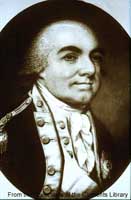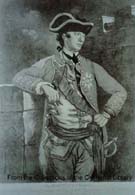Saratoga Background
1777
 |
 |
 |
 |
|
|
|
|
|
British general John Burgoyne surrendered at Saratoga, New York on October 17, 1777. The American victory marked a turning point in the Revolutionary War because France became convinced that the Americans could win the war. France contributed money and military equipment, and forced the British to scatter military resources to defend the rest of their empire. Great Britain's weakened force was no longer strong enough to battle the Americans in the North.
Many factors contributed to the Saratoga defeat, including lack of careful planning and coordination, unwarranted optimism about the war ending in 1777, and mistaken assumptions about loyalist support in America. Two letters in Sir Henry Clinton's papers at the William L. Clements Library, authored by General William Howe and Clinton and sent to Burgoyne, provide evidence of serious miscalculations in British strategy.
Saratoga fall-out was swift and lasting. Clinton, at the request of
the cabinet, took over Howe's command in January 1778. Howe believed he
was not at fault, and defended his actions in front of Parliament. Burgoyne's
parliamentary inquiry began in May 1779. Findings were inconclusive, but
Burgoyne was deprived of most of his political offices. Howe and Burgoyne
are not entirely responsible for Saratoga. Another man, Lord
George Germain, played an important role. Germain was Secretary of
State for the American colonies. He was charged with managing Howe's and
Burgoyne's commands in North America. Germain is blamed for failing to
issue clear orders or facilitate communication among participants, and,
most importantly, for approving two seemingly incompatible campaigns.
|
Previous Story |
Next Story |
![]()
|
|
|
|
Letters | Stories | Methods | People | Routes | Timeline | Home
Clements Library | Sir Henry Clinton Collection | Teachers' Lounge | About the Project | Bibliography